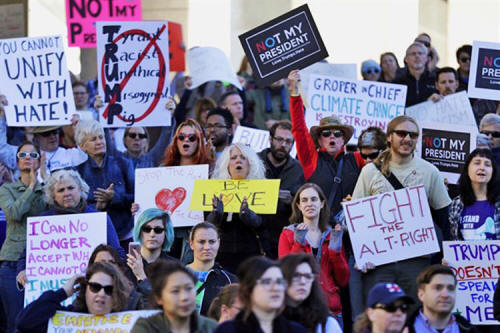|
The Brexit referendum and the U.S. presidential election have offered clear examples of how emotion and affect increasingly drive political behavior.
In both cases, resentment and anger
over unaddressed grievances, combined with fear and anxiety over
radical disruptions to the economy and national identity, won
out over reasoned arguments in favor of the status quo.
The nature of President-elect Donald Trump's insurgent candidacy and his upset victory magnify both reactions.
The election outcome calls into
question not only fundamental aspects of both of America's
political party coalitions but also, given the uncertainty
regarding Trump's foreign policy declarations during the
campaign, America's role in the world and, by extension, the
global order built upon it.
The euphoria of victory often leads
to overreach, making short shrift of the political capital
gained at the ballot box. And as most incumbents in Western
democracies can attest, the victor's popularity, which usually
spikes after the election, is often painfully short-lived.
Even if Trump walks back some of his more iconoclastic positions or fails to successfully implement them, the grievances that fueled his victory, and Brexit before it, represent a significant challenge to the global order - and they will not disappear.
To the contrary, Trump's victory is a boon for like-minded politicians in France, the Netherlands and across Europe. The impossible has now become possible, and the inconceivable plausible.
Were either country to elect a
government led by populist nationalists, it would almost
certainly
spell the end of the European Union,
removing not only another pillar of the international order, but
the one most fundamentally aligned with the core American values
of democracy, pluralism and the rule of law.
Certainly, part of its current unpopularity is due to the fact that it is an easy target to blame for complicated phenomena.
Productivity gains and global labor
competitiveness, for instance, are more directly responsible for
job losses in developed industrial economies than is trade. And
some of the more spectacular successes of liberal
internationalism, such as
the dramatic reduction in global poverty,
have occurred far from the view of American and European
electorates.
Politics is certainly about explaining complicated phenomena, but the events of this year should make clear that it is also about telling compelling stories. And for now, liberalism's opponents are telling the more compelling story.
To change that, liberal internationalists would do well to craft a new narrative, beginning with discarding the neoliberal ideology that coupled market-driven prosperity with the inevitable triumph of political liberalism.
After all, as cases from Russia and
China to Turkey and across Latin America and Asia have shown,
there is no law of nature that precludes market-driven
prosperity from going hand in hand with authoritarianism.
Now that the shock ofTrump's victory has worn off,resolve, and not despair,must be the order of the dayfor those who would seekto shore up the liberal international order.
A new narrative justifying liberal internationalism is needed, one based on a bottom-up approach that begins by identifying the trends on the ground that are shaping grievances and driving political behavior, and then works backward to identify the changes necessary to effectively respond to them.
This narrative would take into
account feelings as well as facts, propose projects as well as
policies, and offer purpose as well as process.
Some of the resentment on display today is simply nostalgia based on the misreading of a temporary moment of history - namely the postwar period of prosperity - as a permanent condition of a bygone golden era.
But clearly the costs of
globalization's disruption have begun to outweigh the advantages
of its openness to a sizable enough population of voters that
new balances must now be found.
But it will also require seriously tackling the challenges presented by mass immigration, whose benefits for too have long blinded many advocates to the cultural impact that massive influxes of immigrant populations can cause. In some ways this horse has already left the barn, particularly in Europe.
But ignoring the issue or
clinging to outdated ideological dogmas only plays into the
hands of populists who exploit it for electoral advantage.
Clearly some issues require an approach that transcends borders:
Indeed, how effectively these
challenges are handled is directly related to the current rise
of nationalism, because unless people feel fundamentally secure
within their own borders, they will look with hostility on
arrangements that require ceding sovereignty to unaccountable
global bodies.
Should both pull back from the lead on these and other issues, as now seems likely, thought must be given to how to fill the gap so that diplomacy, and not military force, remains the default position for deciding on the rules and norms of global governance.
This will be particularly
salient for guaranteeing human security in areas where it is
under threat and regulating the use of force in international
affairs to prevent a return to limited wars.
That means treating questions of national identity with more respect, without ceding ground on the potential dangers that nationalism can present.
On some issues there can be no
compromise; bigotry and intolerance in all their forms can never
be countenanced. But so long as the discourse over national
identity is dominated by nostalgia for an imagined past, rather
than the opportunities of a shared present and future, the issue
will continue to benefit populists.
Defending liberalism and political pluralism, human rights and dignity, and economic development to better meet the needs of the planet's growing population all make for a compelling narrative.
As a platform, it fits awkwardly into the landscape of realist power politics most likely to characterize a world given over to populist nationalism.
But it is one that liberal
internationalism remains well-suited to advance.
|


